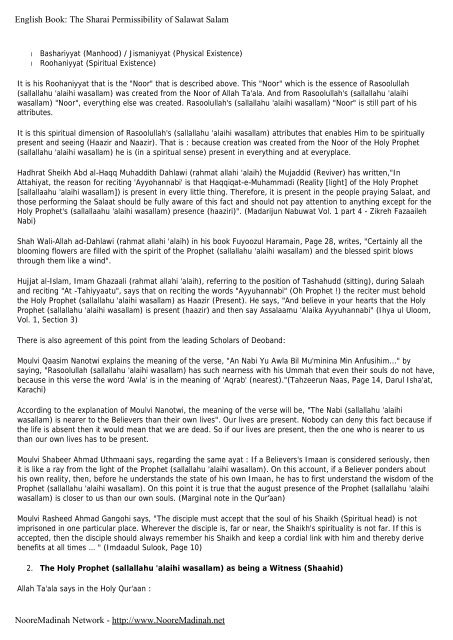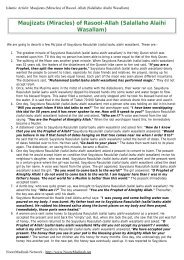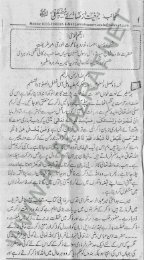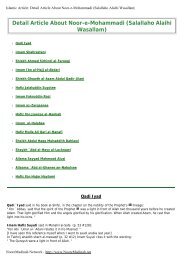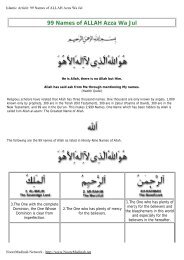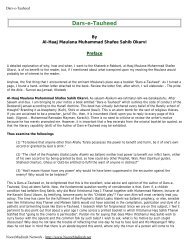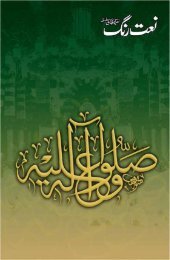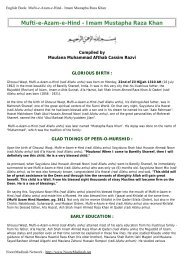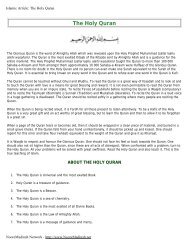The Sharai Permissibility of Salawat & Salam - Noore Madinah ...
The Sharai Permissibility of Salawat & Salam - Noore Madinah ...
The Sharai Permissibility of Salawat & Salam - Noore Madinah ...
Create successful ePaper yourself
Turn your PDF publications into a flip-book with our unique Google optimized e-Paper software.
English Book: <strong>The</strong> <strong>Sharai</strong> <strong>Permissibility</strong> <strong>of</strong> <strong>Salawat</strong> <strong>Salam</strong><br />
l Bashariyyat (Manhood) / Jismaniyyat (Physical Existence)<br />
l Roohaniyyat (Spiritual Existence)<br />
It is his Roohaniyyat that is the "Noor" that is described above. This "Noor" which is the essence <strong>of</strong> Rasoolullah<br />
(sallallahu 'alaihi wasallam) was created from the Noor <strong>of</strong> Allah Ta'ala. And from Rasoolullah's (sallallahu 'alaihi<br />
wasallam) "Noor", everything else was created. Rasoolullah's (sallallahu 'alaihi wasallam) "Noor" is still part <strong>of</strong> his<br />
attributes.<br />
It is this spiritual dimension <strong>of</strong> Rasoolullah's (sallallahu 'alaihi wasallam) attributes that enables Him to be spiritually<br />
present and seeing (Haazir and Naazir). That is : because creation was created from the Noor <strong>of</strong> the Holy Prophet<br />
(sallallahu 'alaihi wasallam) he is (in a spiritual sense) present in everything and at everyplace.<br />
Hadhrat Sheikh Abd al-Haqq Muhaddith Dahlawi (rahmat allahi 'alaih) the Mujaddid (Reviver) has written,"In<br />
Attahiyat, the reason for reciting 'Ayyohannabi' is that Haqqiqat-e-Muhammadi (Reality [light] <strong>of</strong> the Holy Prophet<br />
[sallallaahu 'alaihi wasallam]) is present in every little thing. <strong>The</strong>refore, it is present in the people praying Salaat, and<br />
those performing the Salaat should be fully aware <strong>of</strong> this fact and should not pay attention to anything except for the<br />
Holy Prophet's (sallallaahu 'alaihi wasallam) presence (haaziri)". (Madarijun Nabuwat Vol. 1 part 4 - Zikreh Fazaaileh<br />
Nabi)<br />
Shah Wali-Allah ad-Dahlawi (rahmat allahi 'alaih) in his book Fuyoozul Haramain, Page 28, writes, "Certainly all the<br />
blooming flowers are filled with the spirit <strong>of</strong> the Prophet (sallallahu 'alaihi wasallam) and the blessed spirit blows<br />
through them like a wind".<br />
Hujjat al-Islam, Imam Ghazaali (rahmat allahi 'alaih), referring to the position <strong>of</strong> Tashahudd (sitting), during Salaah<br />
and reciting "At -Tahiyyaatu", says that on reciting the words "Ayyuhannabi" (Oh Prophet !) the reciter must behold<br />
the Holy Prophet (sallallahu 'alaihi wasallam) as Haazir (Present). He says, "And believe in your hearts that the Holy<br />
Prophet (sallallahu 'alaihi wasallam) is present (haazir) and then say Assalaamu 'Alaika Ayyuhannabi" (Ihya ul Uloom,<br />
Vol. 1, Section 3)<br />
<strong>The</strong>re is also agreement <strong>of</strong> this point from the leading Scholars <strong>of</strong> Deoband:<br />
Moulvi Qaasim Nanotwi explains the meaning <strong>of</strong> the verse, "An Nabi Yu Awla Bil Mu'minina Min Anfusihim..." by<br />
saying, "Rasoolullah (sallallahu 'alaihi wasallam) has such nearness with his Ummah that even their souls do not have,<br />
because in this verse the word 'Awla' is in the meaning <strong>of</strong> 'Aqrab' (nearest)."(Tahzeerun Naas, Page 14, Darul Isha'at,<br />
Karachi)<br />
According to the explanation <strong>of</strong> Moulvi Nanotwi, the meaning <strong>of</strong> the verse will be, "<strong>The</strong> Nabi (sallallahu 'alaihi<br />
wasallam) is nearer to the Believers than their own lives". Our lives are present. Nobody can deny this fact because if<br />
the life is absent then it would mean that we are dead. So if our lives are present, then the one who is nearer to us<br />
than our own lives has to be present.<br />
Moulvi Shabeer Ahmad Uthmaani says, regarding the same ayat : If a Believers's Imaan is considered seriously, then<br />
it is like a ray from the light <strong>of</strong> the Prophet (sallallahu 'alaihi wasallam). On this account, if a Believer ponders about<br />
his own reality, then, before he understands the state <strong>of</strong> his own Imaan, he has to first understand the wisdom <strong>of</strong> the<br />
Prophet (sallallahu 'alaihi wasallam). On this point it is true that the august presence <strong>of</strong> the Prophet (sallallahu 'alaihi<br />
wasallam) is closer to us than our own souls. (Marginal note in the Qur’aan)<br />
Moulvi Rasheed Ahmad Gangohi says, "<strong>The</strong> disciple must accept that the soul <strong>of</strong> his Shaikh (Spiritual head) is not<br />
imprisoned in one particular place. Wherever the disciple is, far or near, the Shaikh's spirituality is not far. If this is<br />
accepted, then the disciple should always remember his Shaikh and keep a cordial link with him and thereby derive<br />
benefits at all times … " (Imdaadul Sulook, Page 10)<br />
2. <strong>The</strong> Holy Prophet (sallallahu 'alaihi wasallam) as being a Witness (Shaahid)<br />
Allah Ta'ala says in the Holy Qur'aan :<br />
<strong>Noore</strong><strong>Madinah</strong> Network - http://www.<strong>Noore</strong><strong>Madinah</strong>.net


